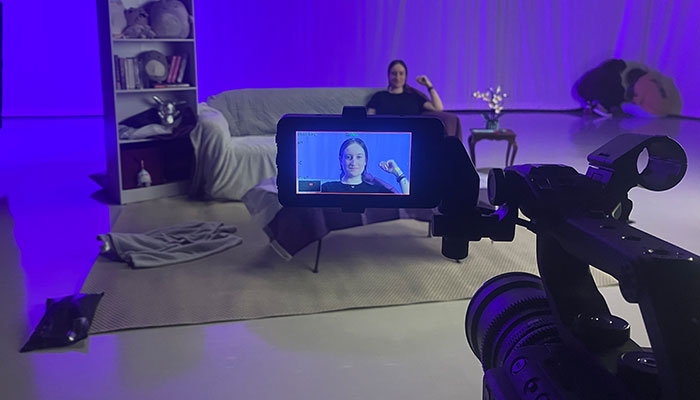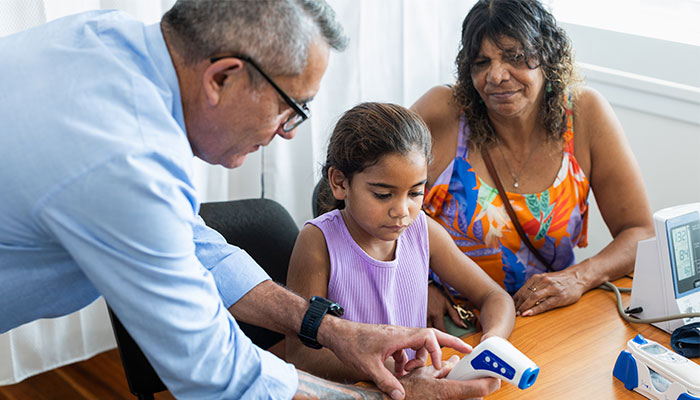The traditional higher education model of lectures and tutorials has been jettisoned. Instead, film students have a series of intensive bursts of practical learning and are sent out to make short films, web series or documentaries.
The aim is to get as close as possible to real-life working conditions, says Dr Iqbal Barkat, Senior Lecturer in Screen Production, in the Department of Media, Communications, Creative Arts, Language and Literature (MCCALL).
Dr Barkat is one of the ‘prac-ademics’ teaching the Screen Practice and Production major offered within the Bachelor of Media and Communications.
“All of us who teach in the screen program here are what we call ‘prac-ademics’. We are practitioner-academics, right? There's not a single person who is teaching screen at Macquarie University who is not also a filmmaker,’’ says Dr Barkat, whose credits include the feature film Mortars, and recent SBS documentary This Is Our School.
“The students respect that. They don't think that we are in some ivory tower.”
The emphasis on hands-on learning is threaded through the screen production units, which include documentary, fiction and open form filmmaking.
World-class facilities
Students have access to the University’s state-of-the-art campus facilities, which are on the original site of AFTRS (Australian Film Television and Radio School) and have received $1billion in investment.

As good as it gets: students have the opportunity to learn their craft using professional equipment and studio spaces.
Facilities include three sound stages, a backlot, props department, professional cameras and one of the largest screen studios in the Southern Hemisphere, along with a technical support team.
“We have a purpose-built film school right on campus,’’ Dr Barkat says.
“Whatever students imagine, they can create.”
Hands-on learning
Third-year Screen Production student Susanna McQueen was attracted to Macquarie University’s opportunities for filmmaking and facilities which include the Avid Media Composer editing system.
We don’t separate the theory and the practical. We combine the two, and give students many opportunities to make films.
Experience with Avid, used by the film and television industries, gives students a head start in applying for jobs.
“Access to Avid is really helpful because it’s industry standard, and there was plenty of technical support,’’ says Susanna, who is aiming for a career as a video editor.
“This degree has also given me the opportunity to begin working in my sector while completing my third year, preparing myself for graduating with experience.”
She will graduate next year with a portfolio of five short films, and a resume including a marketing internship organised as part of her undergraduate degree. She is also doing casual work assisting with video editing for online learning materials at Macquarie University.

Job ready: Screen Production alumni have found work in journalism and communications, news and entertainment, advertising and in the film and TV industry.
Dr Barkat said the access to professional equipment and hands-on learning is what gives graduates the edge in finding jobs in a competitive industry that values experience above all.
“We don’t separate the theory and the practical. We combine the two, and give students many opportunities to make films,’’ he says. “That’s what makes us unique. We are really committed to supporting the job readiness of our students."
Aside from the university’s PACE (Professional and Community Engagement) program, the department also offers its own internship, MCCALL Productions, where students create screen works for community and corporate clients.
Students have recently made videos for the Hornsby Ku-ring-gai Domestic Violence Network, Macquarie University’s Centre for Ageing, Cognition and Wellbeing, and residential developer Stockland.
Once students have wrestled with the complexity of on-set logistics, changing weather, noise from overhead planes, and interpersonal issues, they learn excellent problem solving and collaboration skills.
“Screen production forces you to think on your feet. These skills are applicable across many, many industries,’’ Dr Barkat says.
Job opportunities
Aside from the film and television industries, Screen Production alumni have also found work in journalism and communications, news and entertainment, advertising, and arts practices.
Alumni include ABC journalist Mridula Amin, feature film director Molly Haddon and creative director Joey Ferrone.
- Dreaming of overseas study? The world's your oyster at Macquarie
- Great jobs: From campus to Canva via Twitter
On a deeper level, the course encourages students to see screen production as a lens to explore contemporary social issues. It’s something that has resonated widely with a generation known for its activism and empathy, says Dr Barkat.
“So for us, screen is far more than just entertainment. It is also an attempt at understanding the world we live in.”



